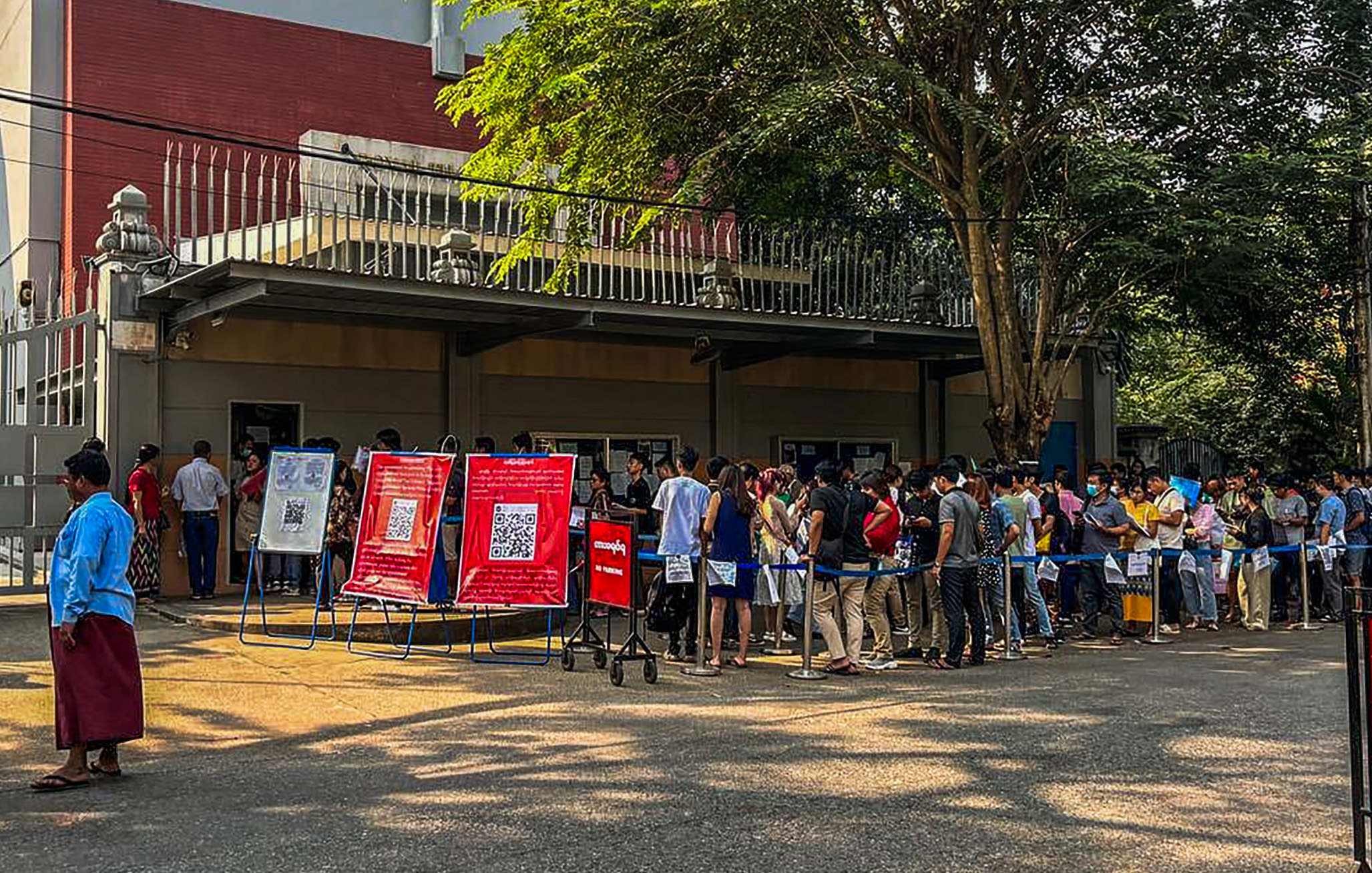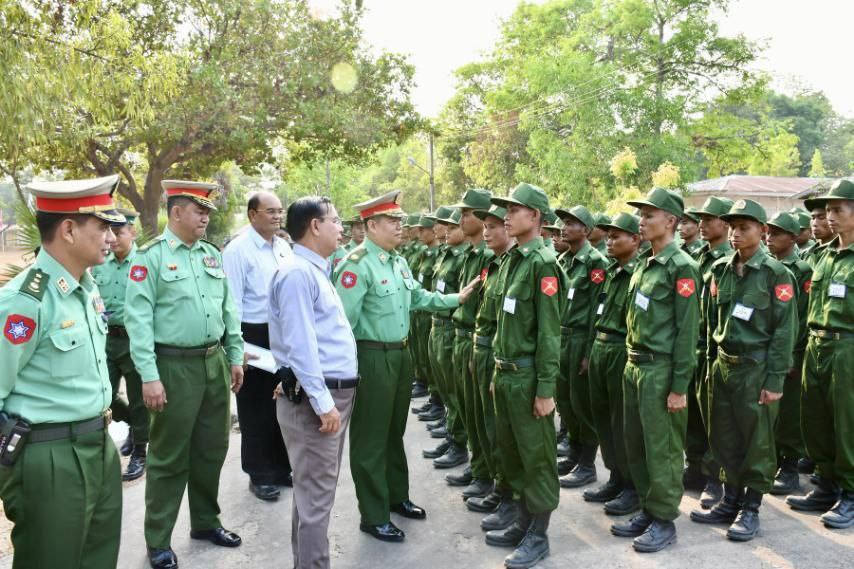It is an exodus for life. A choice between becoming a human shield or fleeing everything you have – your home, your family, your work and everything familiar to you – for a life of disorientation and confusion.
This is how young people who recently fled the junta’s drive for mandatory military service describe their swift and desperate decisions.
Ko Thakka had never considered leaving Myanmar until the junta activated a law requiring military service on Feb. 10 this year. He was running his own convenience store in Yangon where business was “brisk.” Then, an administrator told young men in his ward to sign up for conscription in the first week of March.
Ko Thakka, who is in the conscription age range, abandoned his convenience store and everything he knew to flee to Thailand.
Conscription is “the way to death,” the 27-year-old says, adding for emphasis: It is a death sentence. The junta will use conscripts for human shields, he explains. “This is why I fled Myanmar.”
The junta’s shock activation of the People’s Military Service Law immediately made all men aged 18 to 35 and women aged 18 to 27 eligible to be conscripted into two years of military service. The upper age limit rises to 45 for men and 35 for women if they have specialist expertise. For example, if they are engineers or medical professionals.
That’s 14 million people in Myanmar, or 26 percent of the country’s population of 54 million.
After the initial shock of the law’s announcement, young people – and their relatives – began planning escape routes. Thousands of people have been lining up daily at the Thai Embassy in Yangon and the government passport office in Mandalay to try to get entry visas and travel documents.
Ko Khaing, 28, had help from his parents. He arrived in Bangkok in late March with his 22-year-old brother and 19-year-old sister. He had worked as an assistant manager of a PR firm in Yangon but hails from Bago Region.
His exit, along with his siblings, was triggered by a visit from a ward administrator to their family home in Bago. The administrator arrived at the front door to collect information for a list of eligible conscripts.
Ko Khaing’s parents swiftly decided to send their children out of Myanmar. They knew the junta’s military was depleted after suffering casualties, and desertions, in its escalating wars with ethnic armed organizations and other resistance forces nationwide.
They did not want to sacrifice their children’s lives to help the junta cling to a semblance of power.
Like most the majority of others in the exodus, the three siblings ended up in Thailand.

More bloodshed
Besides the conscription law, junta boss Min Aung Hlaing also enacted the Reserve Military Force Law in February, allowing his regime to send retired soldiers to the frontline.
In his speech at the Armed Forces Day parade last month, he clung to his rationale, saying the activation of the two laws would make the armed forces stronger. “After that, necessary measures will be taken step by step to ensure state peace, stability, and the prevalence of law and order,” he added, apparently oblivious to the latest exodus he sparked.
Lin Htet Aung, a former army captain who defected to the Civil Disobedience Movement, sees only more bloodshed in conscription: more people will be forced to kill each other.
“The junta aims to force people to fight each other. They [draftees] will be used in terrorist operations against civilians,” he explains. “They will be forced to fight anti-regime revolutionary groups.”
Reluctant exiles
Myanmar’s latest exodus comprises young people who had lived in the country despite the coup on Feb. 1, 2021. They could have been arrested for any reason at any time. Still, they stayed.
Under the military dictatorship they lost freedom, educational opportunities and jobs. They may also have been the first generation to have dreams for the future following a brief opening to democratic government. These, too, were lost.
Dr. Thura, a doctor from Mandalay, explains why he left Myanmar: “I don’t want to die.”
His second reason was trouble from the regime if he resisted conscription.
Dr. Thura is 35, but because of his professional expertise he can be conscripted until he turns 45. Moreover, his term of service – under a state of emergency, like the one in Myanmar now – could be for as many as five years.
Dr. Thura ran a clinic in Mandalay. He did not welcome the loss of freedom after the coup, but he could survive.
Then, he found he was on the list of possible recruits. He did not want to die a junta soldier, so he raced to Thailand in early March, he explains.
So far, it has not been easy. “I escaped, but I don’t know what to do here,” he explains. “I feel lost,” he says. He was a doctor but now he’s looking for a job to make ends meet.
The exiles do not trust the junta. Although it announced that the first conscripts would be summoned after the annual Thingyan festival in mid-April, it began summoning conscripts in Yangon, Mandalay and Magwe last month.
The junta is afraid that conscripts might flee during the annual festival, and it is in desperate need to beef up its frontline troops, an analyst explained.

Cannot be trusted
Twenty-four-year Yuya is less says the junta cannot be trusted. According to announcements, she was not in immediate danger. The junta said women would not be among the initial groups conscripted.
She says she does not believe a word it says. She was frightened she would be swiftly conscripted and felt sure this would result in being turned into a human shield.
It was a life-or-death decision, she explains.
She flew from Yangon to Vietnam to apply for a student visa to the United States soon after the conscription law was activated.
Previously, she had been wavering between two options: starting her own business or continuing her studies. Conscription left only one option, she says.
“I don’t even want to say a word to people connected to the military. I’m scared, and I hate them,” she says.
Ko Khaing says he was reluctant to leave. He says his parents forced him and his younger siblings to flee to Thailand.
Now, he is determined to protect his younger brother and sister.
“We have to start a new life here. We have no choice,” says the eldest son.

















